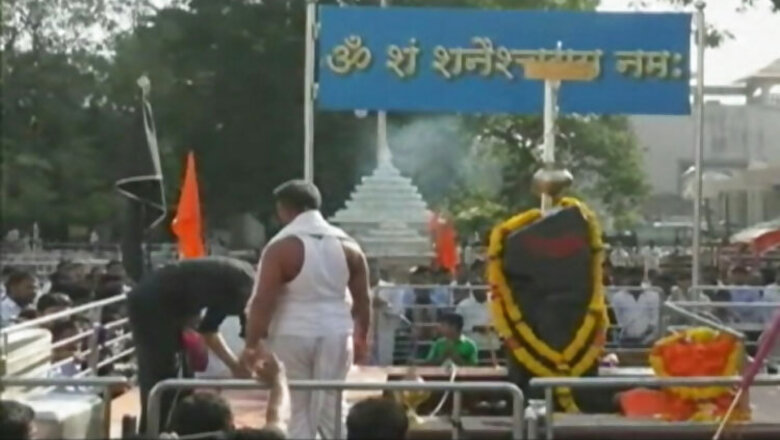
views
In a welcome and progressive move, the Maharashtra government has told the Bombay High Court that it is against gender discrimination in places of worship. The government added that it will strictly implement provisions of Maharashtra Hindu Place of Worship (Entry Authorisation) Act.
The Bombay High Court made the observations in reply to a PIL challenging the ban on entry of women in some temples. The state government said it will be making district authorities aware of the provisions of the Act.
The court, which disposed of a PIL challenging the bar on entry of women in the sanctum sanctorum of Shani Shingnapur temple in the state's Ahmednagar district, said that it can only pass a general direction to the government and cannot go into individual and specific cases.
The Maharashtra government assured the High Court that itis completely against gender discrimination and the provisions of Maharashtra Hindu Place of Worship (Entry Authorisation) Act shall be scrupulously implemented.
"Secretary of Home Department, Maharashtra, will ensure due compliance and enforcement of the provisions of the Act, and in order to ensure that the policy and purpose of the Act is fully carried out, they (Home department) will issue directions to all superintendents of police and collectors in each district of Maharashtra," a division bench of Chief Justice D H Waghela and Justice M S Sonak said.
"The government shall take all necessary steps to implement the Act," it further said. "Ultimately it is the fundamental right of a woman and the government's fundamental duty to protect their (women) right," Chief Justice Waghela said.
The state's acting Advocate General Rohit Deo, in a submission to the high court, said that a circular or a directive shall be issued to all district collectors and Superintendents of Police, making them aware of the provisions of the Act.
The accepted the government's statement. The government's submission was made following high court's rap to the government on Wednesday on the issue, during the hearing of a PIL challenging the prohibition of entry of women in the Shani Shingnapur temple.
"The acting Advocate General has assured the court that the state government is against gender discrimination and keeping in view Articles 14, 15 and 25 of the Constitution. The government can take pro-active steps to ensure that the fundamental rights are fully realised and not allowed to be encroached upon by any authority," he observed.
The high court further said that it can only pass a general direction to the government and cannot go into individual and specific cases. The court said if any person has any grievance that the Act is not being implemented, then he or she can approach local authority with their complaint.
Under the Maharashtra Hindu Place of Worship (Entry Authorisation) Act, 1956, if any temple or person prohibitsany person from entering a temple then he or she faces a six-month imprisonment.
The acting AG, however, clarified to HC that if a temple in the state does not allow any person, irrespective of their gender, inside the sanctum sanctorum, then this Act and its provisions will not be of any help.
"However, if a temple allows men in the sanctum sanctorum but prohibits women, then this Act and its provisions can be used," Deo said.
Notably, the high court had on Wednesday observed that if men are allowed in a place of worship, then women should also be permitted as no law prevents them from doing so.
The HC, while underlining the need for giving equal access to women, also stated that any temple or person imposing restrictions can face a six-month jail term under a Maharashtra law, and asked the government to make a statement if it is worried about the sanctity of a deity.
The court had also said that the government should give wide publicity to the Act and issue circulars, informing the general public at large about the Act and its provisions.
It had directed government pleader Abhinandan Vagyani to take instructions and make a statement today, on whether or not it will ensure that women will be allowed to enter the temple.
The PIL was filed by senior advocate Nilima Vartak and activist Vidya Bal.It said that the prohibition is arbitrary, illegal and in violation of fundamental rights of citizens.
The debate over the issue in Maharashtra escalated after a woman in 2015 tried to enter and offer prayers at the Shani Shingnapur temple in 'breach' of the age-old practice of prohibiting entry of women
This had prompted the temple committee to suspend seven security men and the villagers to perform purification rituals. Subsequently, the Bhumata brigade led by Trupti Desai had on January 26 launched a high-voltage campaign to breach the ban at the temple and vowed to carry on with its movement for gender justice.
Besides, around 150 women under the banner of Bhumata Brigade had last month left for the famous Trimbakeshwar temple in Nashik district seeking to break the bar on female devotees at the inner sanctum of the Lord Shiva shrine. Their attempts were, however, foiled by the police.
Trupti Desai, the activist who led a woman brigade to enter the Trimbakeshwar temple, welcomed the Bombay High Court verdict. Speaking exclusively to CNN-IBN, she said, "This is the victory of women. We will on Saturday go to the Shani temple to offer prayers."
"We will meet the Prime Minister and request him to make a law to allow entry on women in all such temples where women are not allowed", she added.
BJP leader Shaina NC also welcomed the decision and said the issues is not confined to religion only, it is about gender equality.
"Court has given a landmark judgment. We must implement it in all places of worship. Men and women have to be treated equally in the 21st century", she said.
With PTI Inputs.



















Comments
0 comment